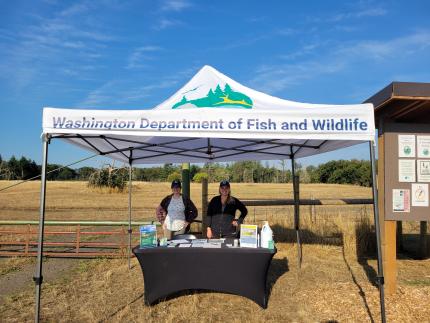
WDFW is proud to partner with Mountains to Sound Greenway Trust, Methow Valley Trails Collaborative, Washington Trails Association, Glacier Peak Institute, and Outdoor Equity Coalition for the third annual trailhead ambassador program in spring and summer of 2025.
This year, WDFW is partnering with Outdoor Equity Coalition and Glacier Peak Institute to hire ambassadors from underrepresented groups in Washington state. WDFW continues striving to make WDFW-managed lands a more welcoming place for all visitors. This new branch of the ambassador program aims to make WDFW trailheads more approachable for Washingtonians while fostering new partnerships with marginalized communities.
This work is part of WDFW's 10-Year Recreation Strategy for WDFW-managed Lands, aiming to improve visitor experiences and reduce recreation impacts. In recent years, there has been a dramatic increase in the number of visitors to WDFW-managed lands, including many people who have just discovered the joys of recreation and have less experience in the outdoors.
This program uses volunteers to welcome visitors at popular points of entry to WDFW-managed lands, provide information about the area, and offer education so that they can recreate safely and responsibly.
The program will be running at locations across the state at various times, including:
- Lewis Butte Trailhead and Pipestone Valley Trailhead, Methow Wildlife Area: April-June
- Quincy Lakes Trailhead, Columbia Basin Wildlife Area: April-June
- Leque Island, Skagit Wildlife Area: April-June
- Samish River Unit and Fir Island, Skagit Wildlife Area: April-June
- Manastash Ridge Trailhead, Wenas Wildlife Area: May-July
- Joe Watt Trailhead, L.T. Murray Wildlife Area: May-June, September-October
If you're interested in becoming an ambassador at the Methow Wildlife Area locations, visit the Methow Valley Trails Collaborative website. To volunteer to become an ambassador at the Manastash Ridge or Joe Watt locations, visit the Mountains to Sound Greenway Trust website. To sign up to become an ambassador at the Leque Island unit of the Skagit Wildlife Area, visit the Glacier Peak Institute; those interested in the Samish River and Fir Island opportunities at the Skagit Wildlife Area can visit the Outdoor Equity Coalition website. To become an ambassador at the Quincy Lakes trailhead of the Columbia Basin Wildlife Area, visit the Washington Trails Association website.
Background information
The 10-Year Recreation Strategy for WDFW-managed Lands provides a road map for reducing recreation impacts while improving recreation access and opportunities for visitors to WDFW-managed land. In recent years, there has been a dramatic increase in the number of visitors, including many visitors with little outdoor recreation knowledge or experience. These guests would benefit from additional contact with agency-affiliated personnel at popular points of entry to WDFW-managed lands to provide welcome and information about the place they are visiting and offer education on how to recreate safely and responsibly. Whenever possible, this role is played by enforcement or regional staff, but WDFW currently lacks the capacity to staff every place where these kinds of engagement could be beneficial.
The WDFW Ambassador Program will extend staffing capacity to make WDFW-managed lands more welcoming by offering hospitality at trailheads and boat launches, while providing information on how visitors can enjoy safe, fun, meaningful experiences, while helping to protect natural, cultural, and tribal resources. The first year of this pilot program was conducted in partnership with the Washington Trails Association.